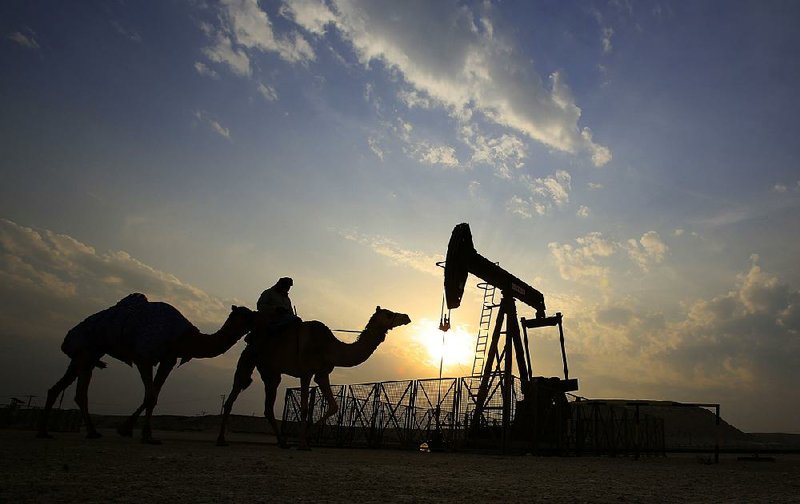ALGIERS, Algeria -- OPEC's unexpected agreement this week to trim production shows that the cartel still has the resolve to try to guide oil prices higher. But analysts say world markets should not expect triple-digit crude prices any time soon.
Ministers from the Organization of the Petroleum Exporting Countries reached a preliminary deal Wednesday in Algeria to cut production for the first time since the global financial crisis eight years ago. The size of the cut was modest -- to between 32.5 million and 33 million barrels per day, which is just below current levels of around 33.2 million barrels per day.
The decision was a surprise -- expectations were that once again the rivalry between Saudi Arabia and Iran would create a stalemate. Oil prices shot up by around 5 percent after details of the agreement leaked.
On Thursday, oil markets were far less frenzied, with the benchmark New York rate rising 78 cents to settle at $47.83 a barrel and the international standard, Brent, 55 cents higher at $49.24.
"I don't think that what we have is a deal," Jaafar Altaie, managing director at consultants Manaar Energy Group, said Thursday. "What we have is rhetoric alluding to a deal that gives breathing room for prices to rise and for OPEC to decide on the terms of its agreement and how to put it into place."
The main concern ahead of the meeting centered on Iran, which has been resistant to cutting production, as it's trying to restore its oil industry since emerging from international sanctions over its nuclear program earlier this year.
"We see this more as an act of desperation," Commerzbank analyst Barbara Lambrecht said.
"Saudi Arabia appears willing to bear the main brunt of the burden."
Saudi Arabia, the world's biggest producer, played a key role in the OPEC policies that helped push oil prices sharply lower over the past couple of years.
In the summer of 2014, oil prices were trading above $100 a barrel, but increased output from non-OPEC countries, particularly the U.S., created an oversupply in the market.
Instead of cutting production, OPEC opted to pump at high volumes to maintain market share and, seemingly, to drive U.S. shale oil and gas producers, who have higher operating costs, out of business.
Crude prices plunged, and in January of this year fell below $30 a barrel for the first time in more than a decade.
The lower prices have hit many oil-producing countries hard, particularly poorer OPEC members Venezuela and Nigeria, but also non-OPEC states Russia and Brazil. It's also taken a toll on Saudi Arabia -- its public finances are not as strong as they were and the country's credit rating has been downgraded.
"Saudi Arabia is betting that a small cut will pay for itself through higher oil prices and hence higher revenues," said Jamie Webster, a fellow at the Center on Global Energy Policy at Columbia University in New York.
Gasoline pump prices have mirrored cheaper oil. The national average price for a gallon of gasoline Thursday was $2.20, compared with $2.29 a year ago, according to AAA. The national average was almost $3.50 two years ago. In Arkansas, the average price Thursday was $1.98 a gallon, compared with $2.05 a year ago.
Oversupply isn't the only reason oil prices have remained under pressure. Weaker economic growth in energy-hungry China, for example, has had a major effect. Earlier this month, the International Energy Agency said growth in oil demand had slowed significantly during the third quarter.
OPEC's hope now is that it will be able to get non-OPEC members, such as Russia, to join efforts to trim output.
"Good luck with that one," said Michael Hewson, chief market analyst at CMC Markets.
Russia is still smarting from economic sanctions and the period of low prices, which have caused a recession and blown a hole in its state budget.
One potential effect of the agreement reached in Algiers is that any material increase in oil prices could encourage U.S. shale-oil producers to return to the market, thereby offsetting any pressure on prices.
As a result, analysts don't expect a return to three-digit oil prices anytime soon.
UBS said that because of high inventories and uncertainties over whether the accord will hold, it does "not anticipate a sharp rally in oil prices." It's forecasting a Brent price of $52 a barrel in the fourth quarter, up from about $46 before the Algiers meeting.
Oil prices will likely drift higher, to between $55 and $60, if the OPEC deal is ratified in November, said Marino Valensise, Head of Multi Asset at Barings Asset Management.
"At those levels, shale producers in the [U.S.] will inevitably increase production," he said.
While the agreement imposed an overall production cap on the group of 14 oil producers, it didn't assign individual limits -- that was left to a committee that will report back at the November meeting.
Agreeing to and monitoring those targets will be difficult.
"They still need to come up with those individual country quotas," Amrita Sen, chief oil analyst at consulting firm Energy Aspects Ltd. in London, said Thursday in a Bloomberg Radio interview. "The devil is in the detail."
Whether or not the OPEC deal sticks and whether "cheating" can be controlled, analysts said this didn't herald a return to the era when OPEC could basically control the oil market through its production levels, not least because non-OPEC countries have a bigger stake than before. Four of the world's top 5 producers aren't even part of OPEC.
"It is just as impossible to restore the conditions that used to prevail on the oil market as it is to step twice into the same river," Commerzbank's Lambrecht said.
Information for this article was contributed by Aomar Ouali and Pan Pylas of The Associated Press, Gregory Viscusi, Anthony DiPaola, Angelina Rascouet, Javier Blas and Grant Smith of Bloomberg News.
A Section on 09/30/2016
